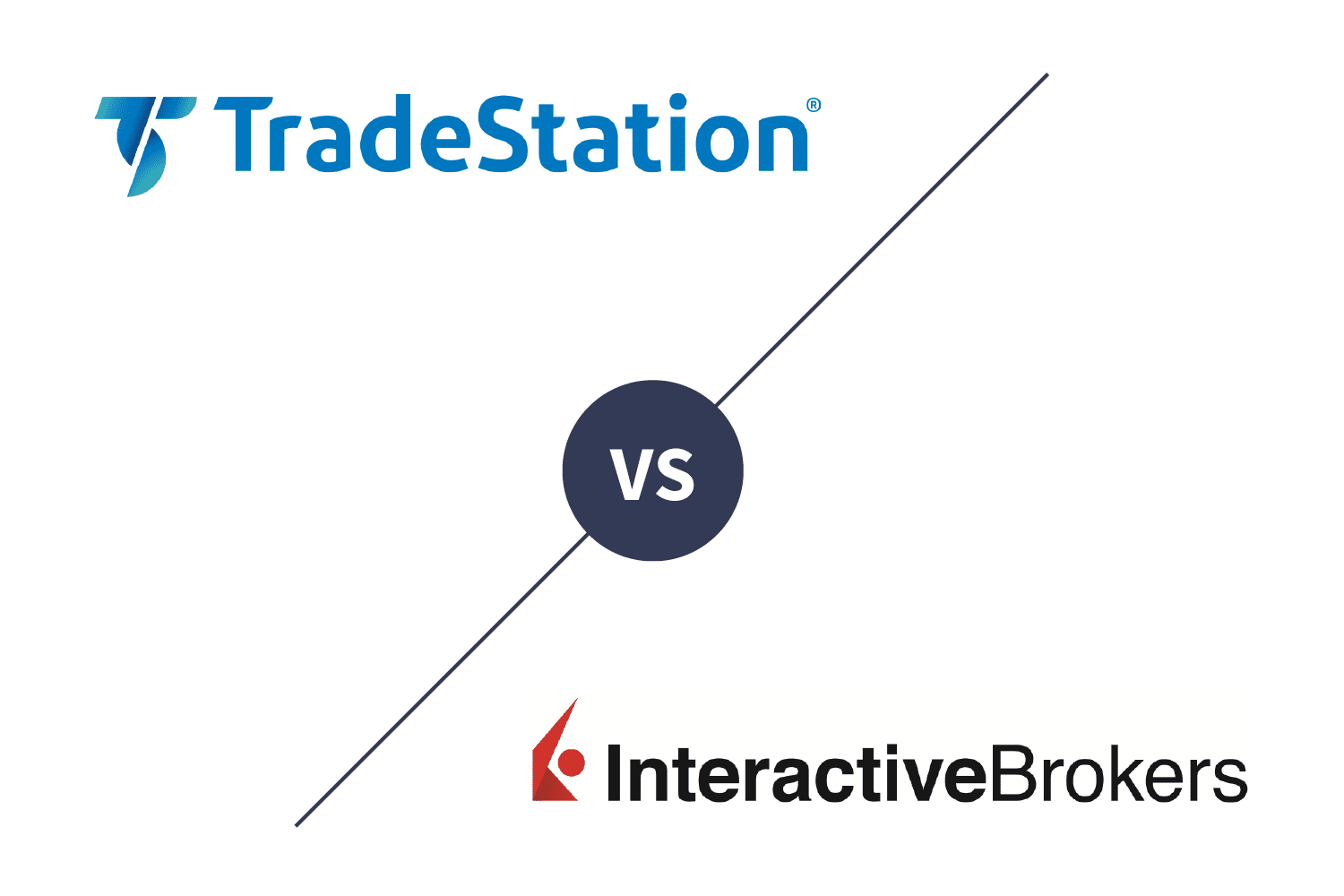TradeStation and Interactive Brokers (IBKR) both offer robust, customizable trading platforms tailored for sophisticated traders. While traditionally catering to this niche, these brokers have expanded their offerings to include cryptocurrencies, and lowered the barrier to entry for more novice traders. Despite these changes to broaden their appeal, Interactive Brokers and TradeStation are still best suited for active, high-volume traders. We’ll take a closer look at these highly-respected brokers to see which one is the right fit for your trading and investing needs.
- Account Minimum: $0
- Fees: $0 stocks and ETFs; options are $0.25/contract, and futures are $1.50/contract ($0.50 for micro e-minis)
- Account Minimum: $0.00
- Fees: $0.00 commissions for equities/ETFs available on IBKR’s TWS Lite, or low costs scaled by volume for active traders that want access to advanced functionality such as order routing. $0.65 per contract for options on TWS Lite; that is also the base rate for TWS Pro users, with scaled rates based on volume. $0.85 per contract for futures, also scales with volume for TWS Pro users. 0.12%-0.18% on cryptocurrency trades depending on volume with a minimum $1.75 fee per trade.
Usability
TradeStation offers clients both mobile and web trading. Its desktop platform, TradeStation, connects directly to dozens of stock, futures, and options market centers to support high-quality fills. The company also has a full-featured mobile app. Investors have the option to trade stocks, ETFs, options, futures, futures options, IPOs, bonds, mutual funds, and cryptocurrencies. Regardless of the platform, investors can view charts with real-time streaming data and news, add technical indicators, and create custom watchlists.
Interactive Brokers has Trader Workstation (TWS), a desktop platform, and two mobile apps. The company offers unrivaled access to 150 markets in 200 countries in stocks, ETFs, options, futures, currencies, bonds, mutual funds,cryptocurrencies, and even forecast contracts from an all-in-one platform, 24 hours a day and six days a week. Accounts can be funded in 24 currencies, and trade assets denominated in multiple currencies. Traders also have access to the GlobalAnalyst tool, which can scan world markets for undervalued stocks. Additionally, IBKR offers access to real-time streaming data, charting, tools, research, and news on all of its platforms.
While TradeStation has a reputation of catering to high-net-worth, experienced, and active traders, the company has undergone somewhat of a rebranding to expand its reach to investors of all experience levels. Interactive Brokers still remains focused on the more sophisticated, active trader with its Pro account but offers similar options to more novice investors with its IBKR Lite account. As both of these brokers are still, at their heart, largely built with the experienced trader in mind, they are tied in terms of usability.
Trade Experience
Desktop Experience
TradeStation’s desktop platform, TradeStation 10, offers investors impressive tools for both speed and flexibility, including powerful market-scanning tools, fully customizable charting, quick and dependable trade execution, and advanced order management. Key features of the desktop platform include RadarScreen, which can monitor up to 1,000 symbols in real time based on more than 180 fully customizable technical and fundamental indicators. TradeStation also offers the Matrix, which is a trading tool that combines the benefits of a detailed market depth window, a highly advanced order-entry tool, and a precise order-tracking system—all in one application. Last, there is OptionStation Pro, a powerful options trading analysis app.
TradeStation also offers window linking between applications.This allows traders to connect one window with another window (or multiple windows) based on a common symbol or interval. This means that investors can enter a symbol in RadarScreen, and the Chart Analysis and Matrix windows, for example, will automatically update to that symbol, thereby taking research and order entry to the next level. All TradeStation platforms offer real-time streaming data, and you can place, modify, and cancel orders directly from a chart.
Interactive Brokers’ Trader Workstation also gives investors a plethora of functionality and features, primarily created for active traders who are looking for flexibility and access to multiple products. Trader Workstation is customizable and provides trading, order management, portfolio management tools, and charting. Traders have access to a multitude of order types, including algorithmic trading, defining hotkeys to place orders quickly, and options to stage orders for later execution—either one at a time or in a batch. Investors can set a date and time for an order to be executed or submit a conditional order that becomes active after specific parameters have been met. Orders can be placed, modified, and managed directly from the chart. Streaming real-time quotes, charting, and news are available across platforms, even if you’re using multiple devices simultaneously.
As expected, both desktop platforms from these brokers offer a robust trading experience. TradeStation 10 has an edge in automation, offering EasyLanguage as a way to code and backtest trading strategies. IBKR has its own strength in that its single platform provides access to an unrivaled number of asset classes and tradable instruments around the globe. The trade experience on both is excellent, sothe ultimate choice comes down to whether you are more interested in automation capabilities or in trading a wider selection of markets and assets.
Mobile Experience
Most traders with Interactive Brokers and TradeStation will be using the desktop platforms, but even the most dedicated trader is away from the desk at times. The TradeStation mobile app is available for iOS and Android, and supports the same trade types as the desktop version. Traders can also access real-time streaming data and free news provided by Benzinga.
Interactive Brokers’ main app, IBKR mobile, mirrors the TWS, with the inherent capacity to trade all the same asset types and execute the same orders. The mobile platform offers the same research capabilities and tools, so it works as an on-the-go solution in the same way that TradeStation’s app does. Additionally, IBKR offers GlobalTrader, a new international trading app which allows investors to deposit funds in local currencies and trade stocks from 90+ global stock exchanges from your phone or tablet, and Impact, a mobile app created for investors pursuing ESG investing.
Both companies offer traders a similar mobile experience for active traders, with comparable trading options, order executions, and research capacity. However, IBKR does offer additional apps for international trading and ESG investing, so Interactive Brokers gets the edge in this category.
Range of Offerings
TradeStation offers a decent range of trading products. However, not all trades can be placed via the desktop or the mobile app, and may require broker assistance. Investors can trade stocks, ETFs, options, futures, and IPOs from the desktop, web, and mobile platforms. Before placing trades, they must select their equities account from a dropdown menu, since equities, crypto and futures all trade on separate platforms.
Interactive Brokers allows investors to fund their accounts with one of 24 currencies and trade any product in a different currency. IBKR also supports trading in fractional shares. Customers can trade nearly 43,000 mutual funds, about 18,000 of which are no-transaction-fee funds, and all funds in its marketplace are no-load. This flexibility is offered through an all-in-one integrated account. Lastly, as of Oct. 7, 2024, IBKR clients can also bet on the outcome of the 2024 U.S. Presidential Election via exchange-listed Forecast Contracts.
Because of the expansive range of offerings, the all-in-one trading platform, and the additional flexibility of fractional share trading, Interactive Brokers easily has the edge in this category.
Order Types
TradeStation platforms support conditional orders, bracket orders, and trailing stops, and multiple orders can be entered concurrently. The TradeStation 10 desktop platform offers additional advanced order rules, such as activation rules that allow orders to be sent to the market based on a set price or time.
Interactive Brokers offers access to over 90 order types and algos, also offering third party algos to provide additional order type selections for clients. The vast array of order types offered by IBKR makes them a standout in the industry in this category.
Trading Technology
TradeStation was founded as a technology company, and still focuses on providing additional benefits to tech savvy traders with a full-powered platform on which the company’s own flagship products are built. Traders are able to use any programming language that can access the internet (C#, C++, Python, PHP, Ruby) and mesh TradeStation’s dynamic data into their signal-based system to scan for new ideas, analyze performance, and more. TradeStation also recognizes that the way a broker routes your order affects whether you receive the best price available, so TradeStation uses intelligent order routing technology to automatically choose the best route for you when you place the order.
Relatively unique to the industry, TradeStation offers investors a trading simulator tool. The feature allows investors to try out investment strategies and ideas using simulated virtual currency, with the option to choose between real-time trading or back-testing strategies with one of the industry’s largest historical market databases. Interactive Brokers also offers a paper trading account, but lacks the back-testing capabilities of TradeStation.
Interactive Brokers employs technology that allows traders to immediately transmit orders from the chart using Hotkeys; set alerts based on time, price, margin, and other criteria; choose from over 120 technical indicators and overlays to add to their charts; scan world markets for undervalued stocks; fund accounts in 24 currencies; and trade assets denominated in multiple currencies.
IBKR also offers SmartRouting to investors with an IBKR Pro account. SmartRouting automatically transmits the best available prices for stocks, options, and combinations across exchanges. SmartRouting isn’t a one-and-done process but considers each leg of the transaction and continuously evaluates fast-changing market conditions with the capability to re-route all or parts of your order for optimal execution and maximized rebates. Additionally, IBKR SmartRouting Autorecovery re-routes your U.S. options order in the case of an exchange malfunction, with IBKR undertaking the risk of double executions. Finally, to assist in delivering price improvement on large volume and block orders and take advantage of hidden institutional order flows that may not be available at exchanges, IBKR includes eight dark pools in its SmartRouting logic.
Both companies are highly competitive with each other and within the industry when it comes to technological offerings for traders. However, TradeStation rises above the competition in this area due to offering simulated trading.
Costs
TradeStation offers straight-forward, commission-free pricing on all accounts. The company is also offering new account holders the opportunity to lock in 50 percent off futures brokerage fees forever, using code FUTRAFZT, making micro futures $0.25 per contract, per side, and futures options $0.75 per contract, per side. Below is a breakdown of TradeStation’s fees:
- Stocks & ETFs: $0 commission
- Stock Options: $0 commission + $0.60 per contract
- Futures: $0 commission + $1.50 per contract, per side
- Micro Futures: $0 commission +$0.50 per contract, per side
- Futures Options: $0 commission + $1.50 per contract, per side
Interactive Brokers’ commissions and fee schedule can be somewhat complex to navigate. Actual costs depend on whether the investor has an IBKR Lite account or an IBKR Pro account and the country where the client is based. The company does offer low commissions on products across 150 global markets, with no added spreads, ticket charges, platform fees, or account minimums.
TradeStation offers standard, simple pricing, while Interactive Brokers’ pricing structure is more complex, albeit potentially money-saving for high-volume traders.
Margin rates also vary considerably across the two brokers. Interactive Brokers charges IBKR Lite clients a flat rate of 7.33%, while IBKR Pro pay 5.33%-6.33%, depending on the account size. TradeStation clients are charged 13% on accounts under $50,000, 12% on accounts $50,000 – $499,999, with negotiable rates for accounts above $500,000.
Lastly, Interactive Brokers offers a competitive interest rate on uninvested cash, as high as 4.33% as of October 2024, depending on account size, available for accounts with balances over $10,000. By contract, TradeStation only pays 0.15% interest on unused funds in accounts of over $100,000.
Given the lower starting ranges of trading fees, better margin terms, and competitive interest on uninvested cash, Interactive Brokers takes an easy win in this category.
Research Amenities
TradeStation offers limited research, noting 30-minute lag times from the market. Almost all of its tools focus on the technical side of trading, and fundamental research is skipped almost entirely. Traders can find “Hot Lists.” which shows the market’s top movers, “Analyst Top Buys & Sells,” with recent analyst actions, and view the latest market stories from Benzinga under the “Market News.”
Interactive Brokers offers several free sources of real-time research, news, and analysis to clients. There are also additional paid services that investors can subscribe to, many offering a free trial period. Research services are also available to investors with demo accounts and do not require an account application to be approved, or an account to be funded.
With the profusion of free, real-time research and news, IBKR easily edges out TradeStation in this category.
Portfolio Analysis
Portfolio Maestro is a free, external feature of the TradeStation platform. It allows you to backtest and examine the performance of a group of strategies applied to a basket of symbols in a portfolio, as well as rebalance the allocation of your portfolio assets. The performance is based on the trades generated by the rules of your strategies, including your money management and ranking criteria. There are several reporting and evaluation features that help you optimize your portfolio, by analyzing the performance of the overall portfolio and of each individual symbol.
Interactive Brokers provides both individual and institutional investors with PortfolioAnalyst, an innovative portfolio management software and account aggregation system. PortfolioAnalyst allows investors to consolidate, track, and analyze their portfolios. The system provides real-time monitoring, analysis and trading, advanced reporting, global support, benchmarks, risk metrics, and powerful on-the-go analytics. Investors can add the following accounts to get an overall comprehensive picture of their financial situation: investment, checking and savings accounts, credit cards, annuities, mortgages, student loans and more.
IBKR’s ability to link external accounts and provide an overall financial picture gives the company a clear advantage in portfolio analysis.
Education
TradeStation offers educational articles and tutorials to help investors better understand the markets and learn how to utilize their TradeStation account. Investors can easily find information on a variety of topics. TradeStation also offers a sizable collection of trader education presentations and courses through its affiliate, YouCanTrade. Through YouCanTrade, clients can ask questions and interact with coaches, receive trade alerts, join free webinars, take courses, and watch live trading in trading rooms. The most valuable education tool for traders, however, remains the company’s trading simulator.
Interactive Brokers also offers traders free resources for investor education. Investors will find extensive education content on the IBKR Campus. Traders’ Academy helps traders learn how to make investment decisions in equities, fixed-income, options, crypto, futures, forex, and more. Investors can also learn how to use IBKR’s trading tools, including how to navigate Trader Workstation (TWS), as well as IBKR Mobile, Client Portal and TWS API applications. Then there are Traders’ Insights from analysts, webinars, podcasts, blogs, videos, and a trading lab. IBKR also offers multi-language tutorials to aid international investors. Here again, though, the most valuable educational tool is the ability to use TWS for paper trading practice.
Both companies offer extensive educational resources, but IBKR’s offerings are slightly more comprehensive.
Customer Service
TradeStation offers Client Services and Technical Support via phone or live chat, Monday through Friday, 8 a.m. to 5 p.m. Eastern. There is also access to the TSbot, an online chat box, where prospective or current clients can receive pre-programmed answers to basic questions. The Trade Desk has more extended hours to meet traders investing needs:
- Stocks / Options: Monday – Thursday, 7:30 a.m. – 6:30 p.m. ET, Friday, 7:30 a.m. – 5:00 p.m. ET
- Futures: Available 24 hours from Sunday 5:00 p.m. to Friday, 6:00 p.m. ET
IBKR provides 24-hour customer service each business day via regional Client Services Centers located throughout America, Europe and Asia. The company has Quick Tips, which is designed to answer basic client questions, and a chatbot that guides you to relevant resources. However, if help is still needed, customer service agents are available for assistance. Existing clients, as well as clients in the application phase, are encouraged to submit formal inquiries via the Message Center located within Account Management or via the email link on the support page because inbound communications sent via commercial email are not supported due to security and spam concerns. IBKR offers live, online chat services to current and prospective clients 24 hours a day Monday through Friday, and 1 p.m. to 7 p.m. ET on Sundays.
While both companies offer some form of 24-hour customer service, TradeStation’s scope of service is limited to trading assistance, except during traditional business hours. IBKR provides 24-hour customer service each business day, edging out the competition in this category.
Security
TradeStation has implemented two-factor authentication through the Auth0 Guardian app, Google Authenticator app, and SMS text messaging and biometric login for mobile devices. The company also utilizes a 256-bit data encryption to protect its websites and applications and has implemented advanced hardware and software firewalls to prevent unauthorized parties from gaining access to the systems. TradeStation carries excess Securities Investor Protection Corporation (SIPC) insurance provided by Lloyd’s of London with an aggregate limit of $300 million to pay amounts in addition to those returned in a SIPC liquidation. The maximum for any single customer is $24.5 million with a cash limit of $900,000 per account.
IBKR requires all users to be two-factor authenticated and does not allow users to partially or fully opt out. Mobile app users can log in using face or fingerprint recognition, or a passcode. Interactive Brokers’ internet-facing servers are protected from access through firewalls and/or other security devices, and the company’s critical servers reside on isolated networks that have no direct internet access. Encryption technology is employed for data transmissions across public networks and on portable media devices. Client accounts at Interactive Brokers LLC are protected by the Securities Investor Protection Corporation (SIPC) for up to $500,000, with a cash sublimit of $250,000. Excess SIPC coverage provides up to an additional $30 million, with a cash sublimit of $900,000.
Interactive Brokers and TradeStation both have excellent, above industry standard security. This category is a tie.
Final Verdict
Although both brokers have made efforts to appeal to a wider range of investors, we still see them as being best for active traders. TradeStation and Interactive Brokers offer dynamic, technologically advanced trading platforms. TradeStation is more of a pure technical trading platform, while Interactive Brokers combines the fundamental tools with the technical ones. When it comes to technical trading, the two are very evenly matched.
Overall, however, Interactive Brokers edges TradeStation out in most of our comparison categories. This is thanks to the all-in-one platform, the ability to link external accounts for a more comprehensive portfolio analysis, the over 90 order types, the unparalleled range of markets and tradable assets, the availability of fractional shares, and the vast educational resources provided to clients. Interactive Brokers dominates many different niches when it comes to serving sophisticated traders. That said, TradeStation does outperform Interactive Brokers when it comes to trade automation and backtesting. For a subset of sophisticated traders, this is a critical area and gives TradeStation a niche that IBKR hasn’t made much progress in taking over.
How We Picked the Best Online Brokers and Trading Platforms
Providing readers with unbiased, comprehensive reviews of online brokers and trading platforms is a top priority for Investopedia. We combined our industry research, subject matter expertise, and investor survey data to guide the research and weightings for our 2024 online broker awards. To collect the data, we sent a digital survey with 110 questions to each of the 26 companies we included in our rubric. Additionally, our team of researchers verified the survey responses and collected any missing data points through online research and conversations with each company directly. The data collection process spanned from Feb. 19 to March 19, 2024.
We then developed a proprietary model that scored each company to rate its performance across 11 major categories and 89 criteria to find the best online brokers and trading platforms. The score for each company’s overall star rating is a weighted average of the criteria in the following categories:
Additionally, during our 2024 research, many of the companies we reviewed gave us live demonstrations of their platforms and services via video conferencing methods and also granted our team of expert writers and editors access to live accounts so they could perform hands-on testing.
Through this all-encompassing data collection and review process, Investopedia has provided you with an unbiased and thorough review of the top online brokers and trading platforms.
Learn more about how we review online brokers.







